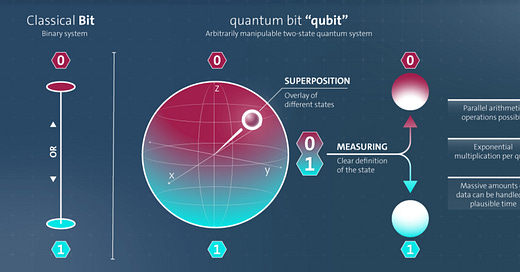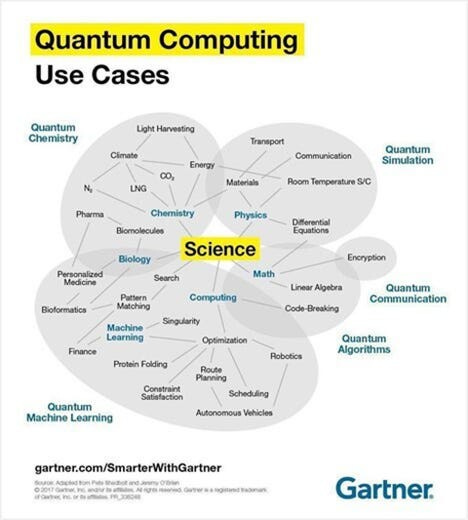Quantum computing is a cutting-edge field of technology that harnesses the principles of quantum mechanics to perform computations far beyond the capabilities of classical computers. Unlike classical computers, which use bits as the smallest unit of data (taking the value of either 0 or 1), quantum computers use quantum bits or qubits. These qubits exploit quantum phenomena such as superposition and entanglement, enabling them to represent and process complex data simultaneously. Quantum computing is disrupting industries by solving complex problems exponentially faster, enabling breakthroughs in areas like drug discovery, cryptography, and optimization. Its transformative potential challenges traditional computing paradigms, opening doors to innovations previously deemed impossible.
What Is Quantum Computing?
Quantum computing is an advanced computational paradigm that leverages the principles of quantum mechanics to process information. Unlike classical computers, which operate using binary bits (0s and 1s), quantum computers use quantum bits or qubits.
Today’s ordinary computers run on chips that use bits for computations. These bits take either of the two values–zero or one–where zero represents the ‘off’ position, and one represents the ‘on’ position. Several such bits that reveal a combination of ones and zeroes are the fundamental units of every website, app, or photograph we use or access.
While bits are convenient to use, they do not essentially disclose that our universe’s nature beyond just the on and off conditions. Uncertainty is intrinsic to our world. However, even the most powerful supercomputers today cannot process this uncertainty, thereby giving rise to a computing void.
Qubits on the other hand can exist in multiple states simultaneously due to a phenomenon called superposition, enabling quantum computers to perform vast parallel computations. This unique capability allows quantum computers to solve certain problems that are infeasible for classical systems, such as simulating molecular interactions or optimizing vast networks.Moreover, quantum computers leverage entanglement, another quantum mechanical property, where qubits become interconnected and influence each other’s states instantly, no matter the distance between them. This interconnectedness enables highly coordinated computations that classical computers cannot achieve.
As a result, quantum computing represents a paradigm shift in technology, poised to disrupt industries and unlock innovations previously thought impossible.
How Does Quantum Computing Work?
Quantum computing operates on the fundamental principles of quantum mechanics, which govern the behavior of particles at the atomic and subatomic levels. Here’s an in-depth look at the key principles that make quantum computing possible:
Qubits
Qubits are the building blocks of quantum computers. Unlike classical bits, which represent a single binary state (0 or 1), qubits can represent both states simultaneously due to superposition. This unique property exponentially increases the computational power, as multiple calculations can occur in parallel.Superposition
Superposition allows qubits to exist in multiple states at once. For example, a qubit can represent 0, 1, or any combination of both. This enables quantum computers to explore multiple solutions simultaneously, making them exceptionally powerful for solving complex problems like optimization and cryptography.Entanglement
Entanglement is a phenomenon where qubits become interconnected, such that the state of one qubit directly influences the state of another, regardless of the distance between them. This property allows quantum computers to perform highly coordinated operations and transfer information instantaneously across qubits.Coherence
Coherence refers to the ability of qubits to maintain their quantum state long enough to perform computations. Maintaining coherence is crucial, as quantum states are highly sensitive to external disturbances, a challenge known as decoherence.Quantum Gates
Quantum gates manipulate qubits to perform operations. Unlike classical logic gates that process bits, quantum gates operate on superposition and entangled states, enabling complex transformations and computations.Interference
Interference is used to amplify the probabilities of correct solutions and cancel out incorrect ones. By carefully designing algorithms, quantum computers leverage interference to converge on the best solution efficiently.Quantum Speedup
The combination of superposition, entanglement, and interference allows quantum computers to solve problems exponentially faster than classical computers, a phenomenon known as quantum speedup.
How Quantum Computing is Transforming Industries?
Quantum computing is rapidly evolving from a theoretical concept to a transformative force across industries. Its unparalleled ability to solve complex problems at unprecedented speeds is driving innovation in various sectors, reshaping how businesses approach challenges and opportunities.
In pharmaceuticals, quantum computing is accelerating drug discovery by simulating molecular interactions to identify new compounds more efficiently. For instance, companies like Roche and GlaxoSmithKline are leveraging quantum algorithms to tackle diseases that were previously beyond reach.
In finance, quantum computing is revolutionizing portfolio optimization, fraud detection, and risk assessment. Financial institutions like JPMorgan Chase and Goldman Sachs are actively experimenting with quantum algorithms to manage complex datasets and predict market trends.
The energy sector is benefiting from quantum advancements in material science, particularly in developing more efficient batteries and solar cells. Collaborations such as ExxonMobil’s partnership with IBM Quantum aim to optimize energy networks and reduce carbon footprints.
In transportation and logistics, quantum computers are optimizing supply chains, routing systems, and scheduling operations. Companies like DHL and Volkswagen are using quantum computing to enhance logistics planning and vehicle route optimization, resulting in significant cost and time savings.
Recent Developements In Quantum Computing
Google’s Quantum Supremacy:
In a groundbreaking achievement, Google announced in 2019 that its quantum processor, Sycamore, completed a specific calculation in 200 seconds that would take the world’s most powerful supercomputers thousands of years to solve. This demonstrated quantum supremacy for the first time, showcasing quantum computing's potential to outperform classical systems in specific tasks.Google's Willow Chip:
Building on the success of Sycamore, Google recently unveiled the Willow chip. It boasts advancements in qubit stability, error correction, and scalability, aiming to address some of the biggest challenges in quantum computing. Willow’s results on this benchmark are astounding: it completed a computation in under five minutes that would take one of today’s fastest supercomputers 10 septillion years—a span so vast it dwarfs the age of the universe. This makes Willow 1,050,000,000,000,000,000,000,000,000,000 times (1 nonillion times) or 1.05 million septillion times faster than today's fastest supercomputers.IBM Quantum Systems:
IBM's release of the Eagle processor in 2021 marked a significant milestone with 127 qubits, setting new records in computational power and making strides toward practical quantum applications. IBM is continuously enhancing its quantum systems with a focus on accessibility for researchers and businesses alike.Amazon Braket:
Amazon’s Braket service provides a platform for researchers and developers to experiment with quantum algorithms using real quantum hardware. This initiative bridges the gap between theoretical research and practical implementation, enabling businesses to explore the potential of quantum computing.China’s Quantum Leap:
Chinese researchers achieved a quantum advantage with a photonic quantum computer capable of solving problems that surpass classical capabilities. This progress highlights China's dedication to leading the global quantum race.Microsoft’s Azure Quantum:
Microsoft's Azure Quantum integrates quantum computing into its cloud ecosystem, providing businesses with tools to experiment with quantum applications. The platform focuses on accessibility and hybrid quantum-classical workflows, catering to a broad spectrum of industries.Startups Leading Innovation:
Startups like IonQ, Rigetti Computing, and D-Wave are at the forefront of quantum innovation. They are making significant advancements in quantum hardware, algorithms, and cloud-based quantum solutions, pushing the boundaries of what quantum systems can achieve.
Opportunities In Quantum Compting
As quantum computing transitions from a niche field to a transformative technology, it is opening up diverse career and research opportunities for professionals and students alike. The demand for skilled individuals in quantum computing is rapidly growing, creating an ecosystem ripe with potential.
1. Career Opportunities
Quantum Software Developers: These professionals design and implement quantum algorithms and software applications using quantum programming languages like Qiskit, Cirq, and Quipper.
Quantum Hardware Engineers: Specialists who build and optimize quantum processors and hardware systems, working on innovations in superconducting circuits, ion traps, and photonic systems.
Quantum Data Scientists: Experts who leverage quantum computing to analyze and interpret vast datasets, offering insights in industries like finance, healthcare, and logistics.
Quantum Cryptographers: Professionals focused on developing quantum-safe encryption methods and securing communication networks in the era of quantum decryption capabilities.
Quantum Research Scientists: Academics and researchers working on theoretical advancements and practical applications of quantum computing.
2. Research Opportunities
Quantum Algorithms: Researchers are exploring algorithms that harness the power of quantum computing for optimization, machine learning, and drug discovery. Shor’s algorithm (for factorization) and Grover’s algorithm (for search) are classic examples paving the way for future breakthroughs.
Quantum Error Correction: Addressing the inherent instability of qubits, research in error correction aims to make quantum computing more reliable and scalable.
Quantum Materials: Developing materials that can sustain qubit coherence and operate at quantum levels is a growing area of exploration.
Quantum Communication: Research in quantum key distribution (QKD) and quantum internet aims to create ultra-secure communication systems.
Quantum AI and Machine Learning: Combining quantum computing with AI to enhance predictive analytics and deep learning.
3. Education and Training
The growing field has sparked the introduction of academic programs, online courses, and workshops aimed at equipping professionals with quantum skills. Some avenues to explore include:
Degree Programs: Universities like MIT, Stanford, and ETH Zurich offer specialized programs in quantum computing and quantum information science.
Certifications: Platforms like Coursera, edX, and IBM Quantum offer certifications in quantum computing basics and advanced topics.
Hackathons and Competitions: Initiatives like IBM’s Quantum Challenge and Qiskit Hackathons provide hands-on experience and opportunities to showcase skills.
Internships: Companies like Google, IBM, and Rigetti Computing offer internships for aspiring quantum professionals to work on cutting-edge projects.
4. Industry-Specific Roles
Industries such as finance, healthcare, energy, and defense are actively integrating quantum computing into their operations, leading to specialized roles:
Quantum Finance Analysts: Professionals optimizing investment strategies and financial models using quantum systems.
Quantum Chemists: Scientists using quantum computers to simulate complex molecular structures for drug discovery.
Quantum Energy Strategists: Specialists working on optimizing energy networks and developing sustainable technologies.
Quantum computing offers a horizon of opportunities for those willing to delve into this transformative technology. Whether through academic research, industrial roles, or entrepreneurial ventures, the field is poised for exponential growth, making it one of the most exciting domains of the 21st century.
Key Skills For Working In Quantum Computing
Quantum computing is a multidisciplinary field that requires a combination of technical expertise, problem-solving abilities, and a deep understanding of quantum mechanics. Whether you're looking to pursue a career or research in quantum computing, developing the following skills is essential to thrive in this domain:
1. Strong Foundation in Quantum Mechanics
Understanding quantum phenomena such as superposition, entanglement, and quantum coherence is critical.
Familiarity with concepts like wave-particle duality, Schrödinger's equation, and quantum measurement.
2. Proficiency in Mathematics
Linear Algebra: Essential for working with quantum states and operations represented as vectors and matrices.
Probability and Statistics: For analyzing quantum systems and interpreting measurement outcomes.
Complex Numbers: Integral to quantum state representation and computation.
3. Expertise in Programming
Knowledge of quantum programming languages such as Qiskit, Cirq, Quipper, or Microsoft's Q#.
Familiarity with classical programming languages like Python for integrating quantum systems with classical simulations.
Experience with cloud-based quantum platforms like IBM Quantum Experience, Google Cirq, or AWS Braket.
4. Background in Physics and Computer Science
Physics: A solid grasp of concepts like electromagnetism and thermodynamics is often necessary, especially for hardware roles.
Computer Science: Knowledge of algorithms, data structures, and computational complexity theory is critical for quantum software development.
5. Problem-Solving and Analytical Skills
Quantum computing involves tackling complex, abstract problems requiring innovative approaches.
The ability to think critically and adapt to unconventional computing paradigms is a valuable asset.
6. Research and Collaboration Skills
Quantum computing projects are often interdisciplinary, requiring collaboration with experts in diverse fields like chemistry, cryptography, and machine learning.
A strong research background helps in exploring theoretical advancements and practical implementations.
7. Familiarity with Quantum Hardware
Knowledge of technologies like superconducting qubits, trapped ions, and photonics for those interested in hardware engineering roles.
Understanding the challenges of decoherence and error correction in quantum systems.
Relevant Courses At BITS Pilani, Pilani Campus
Quantum Information and Computation(BITS F386) - History and scope, introduction to quantum information, quantum bits (qubits), quantum parallelism, teleportation etc. Basic ideas of quantum systems, two-state systems, evolution of states, superposition, entanglement, quantum measurement, decoherence. Basic ideas of computation theories and models, computational resources, complexity. Quantum Gates: single qubit, multiple qubit gates, controlled gates, universal gates, measurement. Quantum algorithms, Deutsch’, Shor’s and Grover’s Algorithms, quantum circuits. Quantum Fourier Transform and applications, Quantum Search Algorithm. Physical Implementation of quantum computation. Compression and transmission of quantum information, quantum noise, errorcorrection, coding and cryptography, complexity, fault-tolerant computation.
Quantum Architecture and Programming(CS F316) - Quantum computing basics, quantum computer architectures, reversible computing, quantum gates, computing models, Ehrenfest’s urn model, Kac-Ring model, designing quantum ALUs, Pendulum instruction set architecture (PISA), fault-tolerant architectures, the Steane code, Quantum processing elements, quantum RAM and quantum addressing, reversible programming, quantum compilers. Pre-requisite: CS F215: Digital Design
Introduction to Quantum Field Theory(PHY F412) - This course introduces the foundations of quantum field theory, including the Klein-Gordon and Dirac equations, group symmetries like SU(2) and the Lorentz group, and the construction of spinors. It delves into the Lagrangian formulation of mechanics, Noether's theorem, scalar and gauge fields, and the geometry underlying gauge theories such as Yang-Mills fields. Advanced topics include canonical quantization of fields, spontaneously broken symmetries, the Goldstone theorem, and applications like superconductivity.
Quantum Information Theory(PHY F428) - Classical Information, probability and information measures, methods of open quantum systems using density operator formalism, quantum operations, Kraus operators. Measurement and information, Entropy and information, data compression, channel capacity, Resource theory of quantum correlations and coherence, and some current issues
Quantum Mechanics For Engineers(PHY F345) - This course covers the fundamentals of quantum mechanics, including wave-particle duality, the Schrödinger equation, operator formalism, and solutions for various potential systems like wells, barriers, and harmonic oscillators. It explores time evolution, wave packets, group velocity, and the quantum mechanics of crystals, including Bloch theorem and density of states. Advanced topics include band structure calculations, semiconductor heterostructures, and quantum nanostructures like wires, wells, and dots.
TakeAway
Quantum computing is still in its infancy stage. The quantum computers that are currently available have specific requirements regarding hardware and cooling temperature conditions. However, as several large companies, governments, and academic institutions continue to invest millions of dollars into the research and development of quantum computing, it won’t be long before quantum computing becomes a ubiquitous computational technology.






